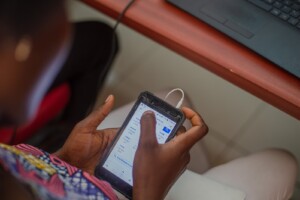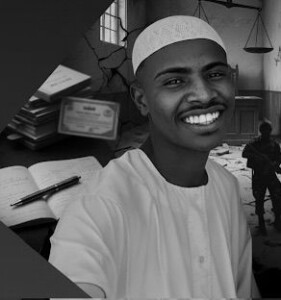NISS arrests journalists at parliament protest
The Sudanese security service has arrested nine journalist during a vigil in front of the parliament building, in protest against the ban from entering the parliament on a well-known Sudanese reporter.
 Journalists protest in front of Sudan's Houses of Parliament in August 2018 (RD)
Journalists protest in front of Sudan's Houses of Parliament in August 2018 (RD)
The Sudanese security service has arrested nine journalist during a vigil in front of the parliament building, in protest against the ban from entering the parliament on a well-known Sudanese reporter.
Reporter Mortada Ahmed told Radio Dabanga that the Sudanese security service (NISS) warned journalists that they would be put into the security apparatus’ vehicles in the event that they didn’t leave the protest in front of the parliament on Monday.
Several journalists at the vigil said they were exercising their constitutional right to express their rejection of the practices. Nine of them have been detained and taken to the NISS premises in Omdurman.
“They have been interrogated for about an hour and held for three hours before the Commissioner of Omdurman, Magdi Abdelaziz intervened, stopped the proceedings and then released them,” according to Ahmed.
The security service also demanded the demonstrators not to carry banners during the vigil denouncing the practices of the parliament against press freedom.
Starting October 9, Mortada Ahmed has been banned from covering activities in Houses of Parliament in Sudan’s second city of Omdurman for two months. He reports for the Sudanese El Akhbar newspaper. That day the authorities also banned prominent international news agencies and satellite channels from entering the parliament to cover its sessions.
Among the correspondents denied access to the parliament are the Turkish Anatolian correspondent, a BBC team, and correspondents for Al Jazeera and AFP.
Press freedom
Also in August, parliamentary journalists carried out two protest vigils in front of the National Assembly in Omdurman and the Journalists Union in Khartoum because of being denied access to the Houses of Parliament to cover its activities.
Media in Sudan are continuously subjected to confiscations of newspapers, and summons and detentions of journalists. In early August, editors-in-chief and the head of the NISS in Khartoum agreed in a meeting to form a committee to deliberate on the so-called red lines set by the security apparatus for Sudanese media. New confiscations of newspapers were therefore briefly suspended.
However, the NISS began gagging the press again starting August 27 confiscated print-runs of at least three newspapers. In early September, three young journalists were summoned by security agents in Khartoum and El Gedaref.











 and then
and then